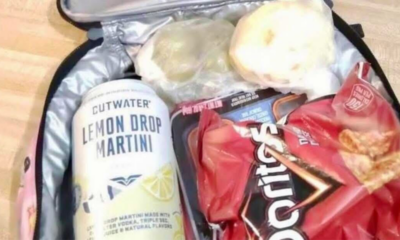Politics
'Sickening': VP Harris slammed by school shooting victims' families over recently unearthed comments

Loved ones of students killed in school shootings slammed Vice President Kamala Harris after unearthed comments from 2019 surfaced this week, detailing that Harris supports removing police officers from schools.
“My brother was killed in the Sandy Hook Elementary School shooting because of liberal policies like the one Kamala is pushing here… I wish there had been a police officer there to protect him. Students need more protection, not less!,” school safety advocate JT Lewis posted to X. Lewis’ younger brother, six-year-old Jesse Lewis, was killed in the 2012 Sandy Hook shooting in Connecticut that left 26 children and staffers dead.
Lewis was reacting to unearthed footage of Harris in 2019, when she was a California senator, declaring her support of removing police officers from schools in an effort to “demilitarize” campuses.
“What we need to do about … demilitarizing our schools and taking police officers out of schools. We need to deal with the reality and speak the truth about the inequities around school discipline. Where in particular, Black and Brown boys are being expelled and or suspended as young as, I’ve seen, as young as in elementary school,” Harris said in 2019 in South Carolina, when she served as a California senator running for president during the 2020 cycle.
KAMALA HARRIS CALLED FOR REMOVING COPS FROM SCHOOLS TO FIGHT RACIAL ‘INEQUITIES’ IN 2019 INTERVIEW
Vice President Kamala Harris speaks at the American Federation of Teachers’ 88th National Convention on July 25, 2024, in Houston, Texas. (Montinique Monroe/Getty Images)
Harris joined the 2019 Presidential Justice Forum at Benedict College in Columbia, South Carolina, in October of that year before she dropped out of the 2020 race and was announced as President Biden’s running mate. A college student asked Harris how she would go about expunging the records of juveniles to allow them to attend college, including expunging “a criminal offense,” not “just a marijuana expungement.”
CRIME SPIKES FORCE SCHOOLS TO REINSTATE RESOURCE OFFICERS AS DEFUND MOVEMENT COLLAPSES
The Connecticut House of Representatives passed the state’s largest gun control initiative since the 2012 Sandy Hook Elementary School shooting in a 96-51 vote. (AP Photo/Robert F. Bukaty, File)
“That’s a great question and a great point, because when we talk about reform of the criminal justice system, we’ve got to understand that the juvenile justice system is in dire need of reform, and I know that. And I’ve seen it,” Harris responded, touting her 2020 campaign’s “plan of action” on criminal justice reform.
ALEXANDRIA CITY COUNCIL REINSTATES SCHOOL RESOURCE OFFICERS AFTER TEACHER, PARENT PLEAS OVER VIOLENCE
“I will end solitary confinement of juveniles, which includes what we need to do to talk about and have a commitment for less incarceration of juveniles. And have guidelines in terms of exactly what those, those numbers should be, because right now, in so many states, children are being incarcerated for … a child being incarcerated for a couple of days is traumatic, much less the weeks, months and years that we’re seeing that happen,” she explained.
Fox News Digital reached out to the Harris presidential campaign earlier this week inquiring whether she still supports removing police officers from schools, but did not receive a reply.
Crews use heavy equipment to tear down the 1200 building of Marjory Stoneman Douglas High School on Friday, June 14, 2024, in Parkland, Fla. On February 14, 2018, a gunman entered the school and killed 17 people. (Miami Herald)
PARKLAND VICTIM’S DAD SLAMS VP KAMALA HARRIS’ ‘PHOTO OP’ VISIT TO ‘PUSH AN AGENDA’: ‘SLAP IN THE FACE’
Other family members of school-shooting victims joined Lewis in their condemnation of Harris’ 2019 comments, including Ryan Petty and Andrew Pollack, two dads who lost their respective teenage daughters in the tragic Stoneman Douglas High School shooting in 2018.
“Wreckless. Radical. Kamala wants to make schools less safe. Your kids aren’t safe with Kamala Harris in office,” Petty, who lost his 14-year-old daughter Alaina Petty in the 2018 shooting, tweeted in response to the Trump War Room posting footage of Harris’ comments.
People visit the memorial for the victims of Marjory Stoneman Douglas High School shooting in Parkland, Florida, which killed 17 people, on the fifth anniversary of the massacre on February 14, 2023. Seventeen people were killed, and another seventeen were injured after a 19-year-old former student opened fire at the school on February 14, 2018. (Photo by Chandan Khanna/AFP via Getty Images) (Chandan Khanna/AFP via Getty Images)
“This is sickening. My daughter was killed because Parkland didn’t have enough security. We need more school resource officers — not fewer!” Pollack, whose 18-year-old daughter Meadow Pollack was killed in the same shooting, posted on X.
Harris’ comments declaring support for the removal of officers from schools were made ahead of 2020’s summer of protests and riots in response to the killing of George Floyd during a police interaction on Memorial Day of that year. Floyd’s death reignited calls from activists to defund the police, which had a cascading effect across the country as liberal cities moved to slash police budgets, and school boards also voted to sever ties with police departments.
FATHER OF PARKLAND SHOOTING VICTIM SPEAKS OUT ON TRAGIC ANNIVERSARY: ‘CRIMINALS DON’T OBEY GUN LAWS’
Researchers with the outlet Education Week found in 2022 that at least 50 school districts between May 2020 through June 2022 had removed officers from school campuses or slashed budgets for school officers. The plans to remove officers from schools, however, were short-lived in many jurisdictions, as violence broke out on campuses when students returned to the classrooms following the pandemic and its lockdowns.
In the face of violence, such as a shooting at a Denver high school, or repeated fights within the Alexandria, Virginia, school district, education officials from coast to coast backtracked on removing officers, welcoming them back to campuses in an effort to curb crime.
Vice President Harris has not sat down for an interview or held a press conference since emerging as the Democratic presidential nominee. (Andrew Harnik/Getty Images)
Harris officially accepted the Democratic Party’s presidential nomination in Chicago last week. She rose to the top of the ticket after President Biden dropped out of the race last month amid mounting concerns over his mental acuity.

Politics
Video: Defense Officials Give No Timeline for War in Iran as U.S. Boosts Forces

new video loaded: Defense Officials Give No Timeline for War in Iran as U.S. Boosts Forces
transcript
transcript
Defense Officials Give No Timeline for War in Iran as U.S. Boosts Forces
At a Pentagon news conference, top defense officials said that the U.S. military was sending more forces to the Middle East and expects to “take additional losses.” Earlier, President Trump said that the U.S. could continue striking Iran for the next four to five weeks.
-
“We didn’t start this war, but under President Trump, we are finishing it. This operation is a clear, devastating, decisive mission. Destroy the missile threat. Destroy the navy. No nukes. President Trump has all the latitude in the world to talk about how long it may or may not take. Four weeks. Two weeks, six weeks. It could move up. It could move back. We’re going to execute at his command the objectives we’ve set out to achieve.” “We expect to take additional losses. And as always, we will work to minimize U.S. losses. But as the secretary said, this is major combat operations.” Reporter: “Are there currently any American boots on the ground in Iran?” “No, but we’re not going to go into the exercise of what we will or will not do. I think — it’s one of those fallacies for a long time that this department or presidents or others should tell the American people. This — and our enemies by the way — here’s exactly what we’ll do. Why in the world would we tell you, you, the enemy, anybody, what we will or will not do in pursuit of an objective?”
By Christina Kelso
March 2, 2026
Politics
Gas prices could jump as Middle East tensions threaten global oil supply

NEWYou can now listen to Fox News articles!
Americans could soon see higher gas prices as escalating tensions in the Middle East threaten a critical global oil chokepoint, raising fears of supply disruptions that could quickly reverberate across U.S. energy markets.
After joint U.S.–Israeli strikes, dubbed Operation Epic Fury, targeted Iranian sites over the weekend and killed Iran’s Supreme Leader Ayatollah Ali Khamenei, concerns quickly shifted to how Tehran might respond and whether oil infrastructure or tanker traffic could become collateral damage.
Any disruption to global crude supplies could translate into higher costs for American drivers at the pump.
“Every time we’ve had flare-ups in the Middle East like we’re seeing right now — and we’ve seen this kind of situation periodically over the last 50 years — it has caused significant disruption to energy markets,” economist Stephen Moore told Fox News Digital.
“I would expect we could see anywhere from 25 to 50 cents a gallon increase in gas prices in the short term,” he said.
Experts say Americans will likely pay more for gas due to the ongoing conflict in the Middle East. (Matthew Hatcher/Bloomberg/Getty Images)
Market data already shows prices moving higher.
Patrick De Haan, head of petroleum analysis at GasBuddy, said oil prices were up $5 per barrel, while wholesale gasoline prices had risen 11 cents per gallon.
He expects retail gas prices to begin climbing immediately, especially in areas where stations tend to adjust prices in sharp, periodic jumps.
The national average could hit $3 per gallon as soon as Monday, De Haan said, with some stations increasing prices by 10 to 30 cents this week and potentially more in markets that see larger price swings.
Moore warned that prices could climb further and remain elevated if vital transit routes or oil facilities are disrupted.
TRUMP PLEDGES TO ‘AVENGE’ FALLEN US SERVICE MEMBERS AS TENSIONS WITH IRAN INTENSIFY
The ongoing conflict in Iran is near a major energy corridor. (Contributor/Getty Images)
“Huge amounts of global oil travel through the Strait of Hormuz, so this could be incredibly disruptive, delaying delivery of oil and gas,” he said.
“The Iranians have already knocked out some oil facilities in the Middle East, and who knows what they’re up to next. When you have less supply, prices go up. The big question is whether this will be a temporary bump or something more prolonged.”
The ongoing conflict sits near the Strait of Hormuz, one of the world’s most strategically important energy corridors.
“This shipping route represents around 25% of global oil trade and 23% of liquefied natural gas trade,” explained Jaime Brito, executive director of refining and oil products at OPIS.
The Strait of Hormuz, a narrow shipping lane between Iran and Oman that has long been a flashpoint during regional crises, serves as a vital artery for global energy markets.
Roughly 20 million barrels of crude oil and petroleum products — about one-fifth of global oil supply — transit the strait each day, underscoring how disruption there can quickly send shockwaves through international energy markets.
HORMUZ ERUPTS: ATTACKS, GPS JAMMING, HOUTHI THREATS ROCK STRAIT AMID US-ISRAELI STRIKES
A satellite view of the Strait of Hormuz, a critical chokepoint for global energy supply, connecting the Persian Gulf to the Gulf of Oman. (Gallo Images/Orbital Horizon/Copernicus Sentinel Data 2025/Amanda Macias/Fox News Digital)
Highlighting the growing concern, Maersk, widely regarded as a bellwether for global ocean freight, said it will suspend all vessel crossings through the Strait of Hormuz until further notice and cautioned that services to Arabian Gulf ports may be delayed.
Still, not all price movements are immediate.
“Developments over the weekend in the Middle East should hypothetically take time to ripple into the global supply chain. An initial assessment would suggest no specific price impacts should be seen in the gasoline market across the world, including the U.S.,” Brito told Fox News Digital.
However, Brito said prices could climb quickly if markets expect trouble ahead, even before supplies are actually affected.
As a result, Brito said, developments in Iran may have already translated into higher gasoline, diesel and other fuel prices in parts of the U.S., depending on regional supply dynamics and individual company pricing strategies.
CLICK HERE TO DOWNLOAD THE FOX NEWS APP
Experts say the increase in gas prices will be largely determined by how long the conflict in the Middle East lasts. (John McCall/South Florida Sun Sentinel/Tribune News Service via Getty Images)
From a domestic standpoint, Brito added that gasoline prices follow a seasonal pattern, typically climbing during the summer travel months.
“March prices are not expected to be significantly high,” he said, noting that spring break travel could support demand in certain areas — but not at the level seen during peak summer driving season.
Ultimately, the direction of gasoline prices will depend less on seasonal demand and more on how the geopolitical situation unfolds in the days ahead.
Politics
Iran’s supreme leader killed in U.S.-Israeli attack, Trump says

TEHRAN — The U.S. and Israel pummeled Iran early Saturday in an attack aimed at razing the Islamic Republic’s nuclear ambitions and thwarting its efforts to influence the Middle East though proxies such as Hezbollah and Hamas.
Iran’s Supreme Leader Ayatollah Ali Khamenei was killed in the attack, according to President Trump, who in a post on Truth Social wrote that “one of the most evil people in History, is dead. This is not only Justice for the people of Iran, but for all Great Americans.”
More than 200 people were killed in Iran and hundreds more injured, according to Iran’s Red Crescent.
The attacks spurred a furious Iranian retaliation, with multiple barrages striking Israel, a number of Gulf nations and Jordan; and fulfilled long-standing fears that a confrontation with Iran would plunge the entire region into war.
Reports of Khamenei’s death prompted diverse reactions worldwide: In portions of Tehran and Los Angeles, home to a large Persian population, people took to the streets to celebrate. In New York, protesters gathered at Times Square to denounce the attack.
The attack came eight weeks after U.S. forces deployed by Trump toppled Venezuelan President Nicolás Maduro, and Trump said Saturday’s operation also presented a chance for regime change.
Addressing the Iranian people, Trump said, “When we are finished, take over your government. It will be yours to take.”
Trump made the comments in an eight-minute prerecorded video. “This will be probably your only chance for generations,” Trump said, adding, “For many years, you have asked for America’s help, but you never got it. No president was willing to do what I am willing to do tonight.”
The Iranian government confirmed Khamenei’s death.
The attacks began with Israeli strikes Saturday morning — a workday in Iran — on Tehran, the capital, with residents speaking of attacks near Khamenei’s compound, the presidential palace, Iran’s National Security Council, the ministries of defense and intelligence, the Atomic Energy Organization and a military complex.
-
Share via
In Tehran there were scenes of panic, with residents racing to stock up on supplies, leaving shelves bare in grocery stores across the city. Others, heeding warnings from authorities of further strikes, decided to leave the capital. Images on social media showed highways leading out of Tehran choked with traffic.
“It’s going to take 10 hours at least, but it doesn’t matter,” said Zainab, who was loading her car with whatever she could stuff inside for the drive to her sister’s home in Iran’s northeast.
By the end of the day, the streets of Tehran appeared all but abandoned, with residents hunkering down for a night punctuated by the sounds of blasts reverberating across the capital.
Israeli Prime Minister Benjamin Netanyahu, a vociferous advocate for attacking Iran — and who has spent years urging Washington to do so — said the campaign would continue “as long as needed.”
Trump, who long insisted Iran cannot have nuclear weapons, also addressed Iran’s efforts in the Middle East in his video message.
“We are going to ensure that the region’s terrorist proxies can no longer destabilize the region or the world, and attack our forces,” he said. “And we will ensure that Iran does not obtain a nuclear weapon.”
Trump also said U.S. military forces “may have casualties,” adding, “That often happens in war.”
The Iranian Foreign Ministry, in a statement, said that “Iranians have never surrendered to aggression.”
Iranian Foreign Minister Abbas Araghchi, who was leading Iran’s delegation in Oman-brokered negotiations, said the war on Iran was “wholly unprovoked, illegal and illegitimate.”
“Our powerful armed forces are prepared for this day and will teach the aggressors the lesson they deserve,” he wrote on X.

Iranians protest on Saturday in Tehran against attacks on Iran by Israel and the United States.
(Majid Saeedi / Getty Images)
Israel’s military said its attacks were the largest military flyover in its history, with some 200 warplanes dropping hundreds of munitions on about 500 objectives.
Outside of Tehran, explosions could be heard in other cities, including Isfahan, Karaj, Kermanshah, Qom and Urmia, according to Iranian state media. An attack on the city of Minab struck a girls’ school, killing at least 85 students and injuring dozens of others, state-run media said.
Iran’s Red Crescent later said 201 people were killed in attacks across the country, and that 24 out of Iran’s 32 provinces were hit. More than 700 people were injured.
Cellphone and internet communications were disrupted shortly after the attacks began but have since been restored.
Iran struck back across the Middle East, with barrages reported on U.S. bases in the United Arab Emirates, Qatar, Bahrain, Kuwait, Iraq, Saudi Arabia and Jordan. Debris from one of those missiles killed one person in the UAE; another struck a hotel in Dubai. A Kuwaiti airport was hit, but no injuries were reported.
Iran also dispatched multiple waves of missiles to Israel, with residents in Jordan, Syria and Lebanon seeing vapor trails crisscrossing the skies above and the explosive sounds of interceptions.
The waves of ordnance spurred airspace closures across the region, with many airlines suspending service to affected countries and leaving tens of thousands of people stranded.
Araghchi informed his Iraqi counterpart, Fuad Hussein, on Saturday that Tehran will limit its response to U.S. military bases in the region, and that Iran was acting in self-defense.
But the attacks nevertheless infuriated Arab governments. Many came out with statements excoriating Iran for what they described as an unprovoked attack on their sovereignty.
Russia, whose ties with Iran have deepened in recent years, demanded Israel and the U.S. halt military operations. According to the Associated Press, U.N. Ambassador Vassily Nebenzia said, “We insist on the immediate resumption of political and diplomatic settlement efforts … based on international law, mutual respect and a balance of interests.”
In a sign of the rapidly expanding impact of the war, messages purporting to be from Iran’s Islamic Revolutionary Guard Corps were sent to ships ordering them to stay away from the Strait of Hormuz with “immediate effect.”
Shutting the strait, a strategic passageway through which one-fifth of global oil supplies pass, would probably lead to an immediate spike in energy prices and disrupt other shipping.
The opening salvos of what promises to be a lengthy campaign come two days after the U.S. and Iran concluded a third round of Oman-brokered negotiations in Geneva aimed at reducing tensions and stopping the prospect of war.
On Friday, Trump expressed displeasure with the pace of the talks, saying the Iranian side was not negotiating in “good faith” or giving in to U.S. demands. But Oman’s Foreign Minister Badr Albusaidi said a deal was “within reach.”
On Saturday, Albusaidi expressed dismay that “active and serious negotiations have yet again been undermined.”
“Neither the interests of the United States nor the cause of global peace are well served by this. And I pray for the innocents who will suffer,” he said in a statement on X.
The American strikes on Iran drew immediate reaction on Capitol Hill as Democrats and a small bloc of Republicans accused the White House of sidelining Congress on actions they fear will trigger a broader conflict in the Middle East.
“By the president’s own words, ‘American heroes may be lost.’ That alone should have demanded the highest level of scrutiny, deliberation, and accountability, yet the president moved forward without seeking congressional authorization,” Sen. Mark Warner (D-Va.), the vice chair of the Senate Intelligence Committee, said in a statement.
Rep. Ro Khanna (D-Fremont) called on lawmakers to back a measure he is co-sponsoring with Rep. Thomas Massie (R-Ky.) that would compel the administration to seek congressional approval before engaging in any further activity in Iran.
“The American people are tired of regime change wars that cost us billions of dollars and risk our lives,” Khanna said in a video posted on X.
As Democrats warned of constitutional overreach, other lawmakers rallied behind the president.
Sen. Roger Wicker (R-Miss.), the Senate Armed Services Committee chairman, said in a statement that Trump had taken “decisive action against the threat posed by the world’s leading proliferator of terrorism, the Iranian regime.”
“This is a pivotal and necessary operation to protect Americans and American interests,” Wicker said.
Secretary of State Marco Rubio notified some members of Congress’ Gang of Eight, which are the top four leaders in the House and Senate and top Democrats and Republicans on the House and Senate intelligence committees, according to CBS News.
Bulos reported from El Obeid, Sudan, Ceballos from Washington, D.C., and special correspondent Mostaghim from Tehran.
-

 World5 days ago
World5 days agoExclusive: DeepSeek withholds latest AI model from US chipmakers including Nvidia, sources say
-

 Massachusetts5 days ago
Massachusetts5 days agoMother and daughter injured in Taunton house explosion
-

 Denver, CO5 days ago
Denver, CO5 days ago10 acres charred, 5 injured in Thornton grass fire, evacuation orders lifted
-

 Louisiana1 week ago
Louisiana1 week agoWildfire near Gum Swamp Road in Livingston Parish now under control; more than 200 acres burned
-

 Technology1 week ago
Technology1 week agoYouTube TV billing scam emails are hitting inboxes
-

 Politics1 week ago
Politics1 week agoOpenAI didn’t contact police despite employees flagging mass shooter’s concerning chatbot interactions: REPORT
-

 Technology1 week ago
Technology1 week agoStellantis is in a crisis of its own making
-

 News1 week ago
News1 week agoWorld reacts as US top court limits Trump’s tariff powers
















